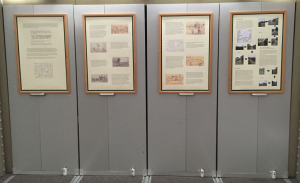This is a report from the Radstock Museum on how they spent the funding from our Dragons’ Den 2 event, and how the community benefited:
Following the success of the grant application for funding of display boards for its Lanes,
Boats and Trains Exhibition, Radstock Museum went ahead and printed the display
boards which tell the story of how transport in Radstock has developed over the years and
the effect of this on the layout of the town and hence the local community.
This picture of a small part of the Museum display below illustrates the part that the display
boards played in the Exhibition. In addition to the display boards there were cases
containing objects associated with the transport systems, some of which belonged to the
Museum and some of which were on loan for this Exhibition.
The Exhibition ran for 3 months from February to the beginning of May, during which time
it attracted a total of just over 1000 visitors, many from within a few miles of the Museum
but one of whom came from Australia (although we do not think specifically to visit the
Exhibition!). Quite a few visitors were young people who seemed to enjoy their time in the
Museum. Some comments extracted from the visitors’ book are contained in a pdf file
which has been sent separately.
The Exhibition has now finished but the display boards have been stored for future use,
both within the Museum and also for use by other organisations when appropriate to
illustrate how transport has developed in Radstock.
Within the Museum the main benefit of the grant has been that we have been able to
produce a much higher quality of presentation of the material that had been assembled for
the Exhibition and in a format which would be able to be kept and re-used. A higher quality
of presentation enhances the visitor experience and this has been reflected in very
positive comments in the visitors’ book during the period of the Exhibition. A further benefit
is that seeing their work so professionally displayed has greatly encouraged the volunteers
who spent hours working on researching and collating data from the Museum’s archives
and from other sources.
The benefit to the local community is that the 1000 or so people who visited, the majority
of whom were from within a few miles of Radstock, now have a much better understanding
of how Radstock transport infrastructure has developed over time and that they can
appreciate that such development is essential if a community is to thrive and prosper. In
addition, these people have also gained an insight into their local community’s history and
their local environment. They now appreciate what their local Museum offers and hopefully
will visit us again or perhaps will volunteer their time to assist in keeping this valuable
asset running successfully.

